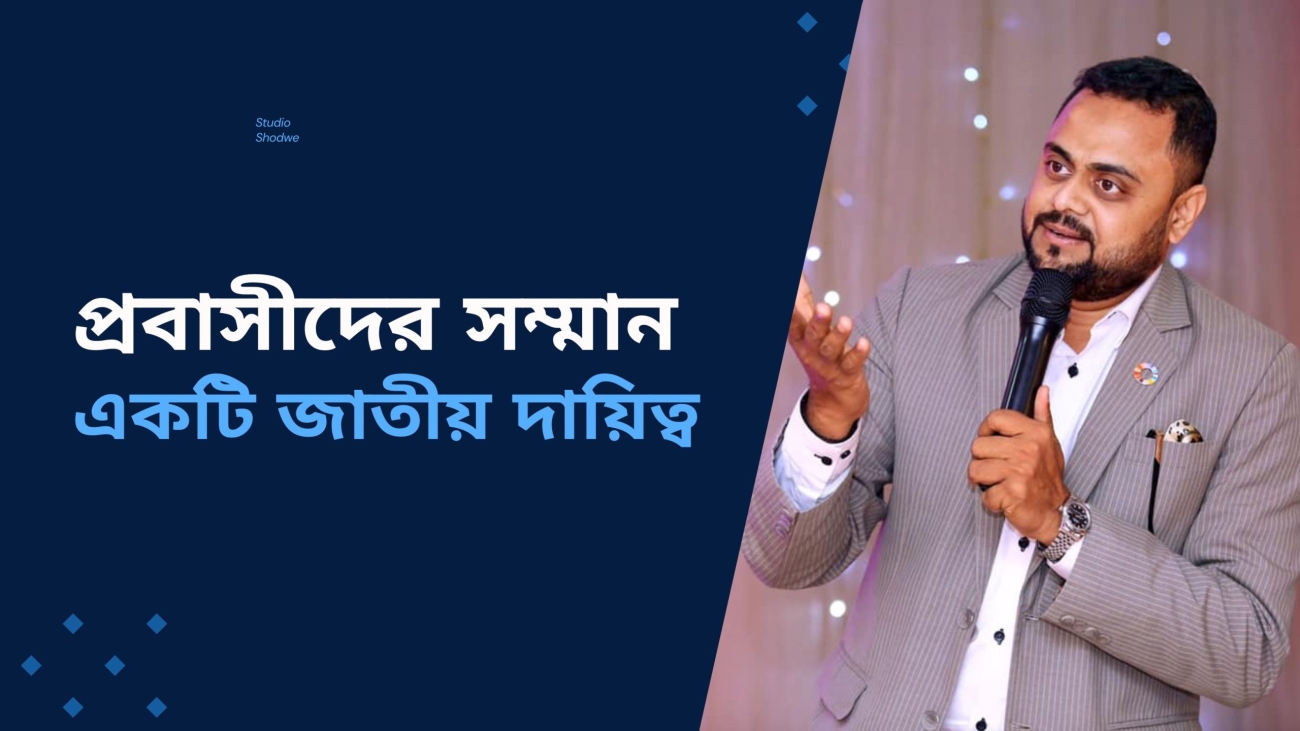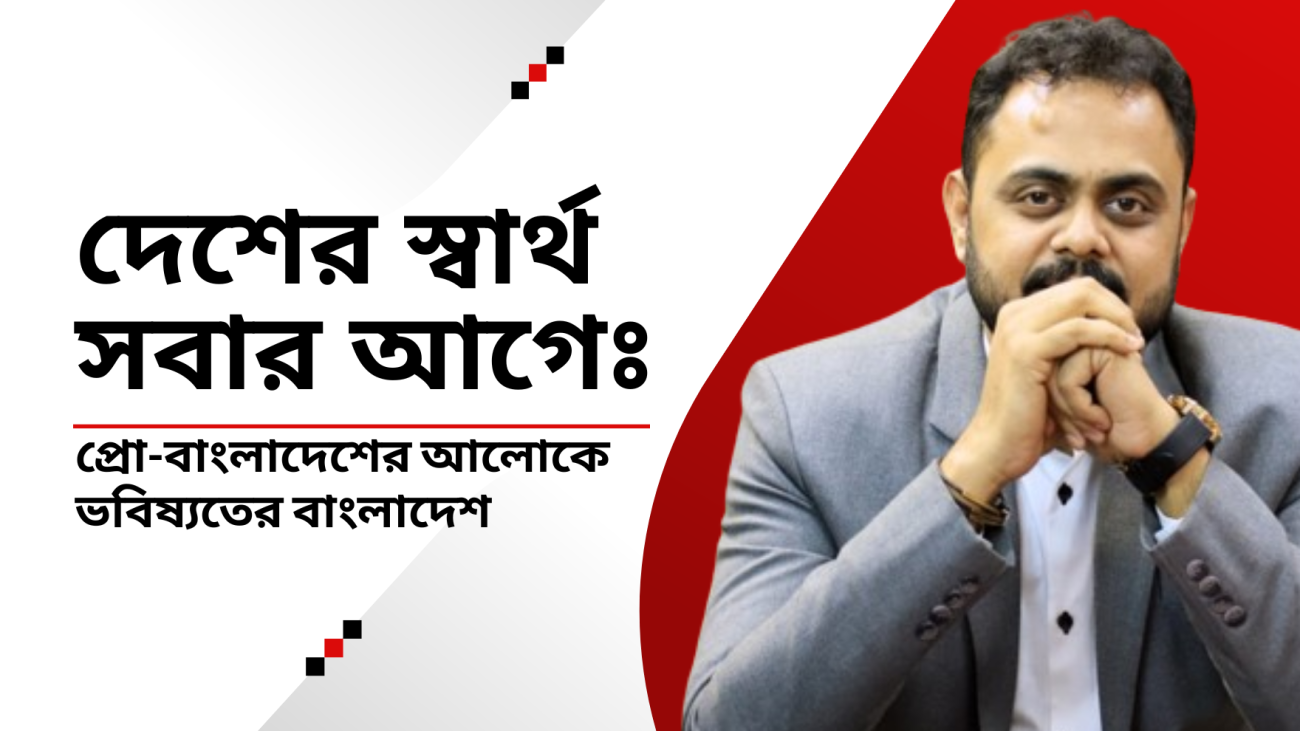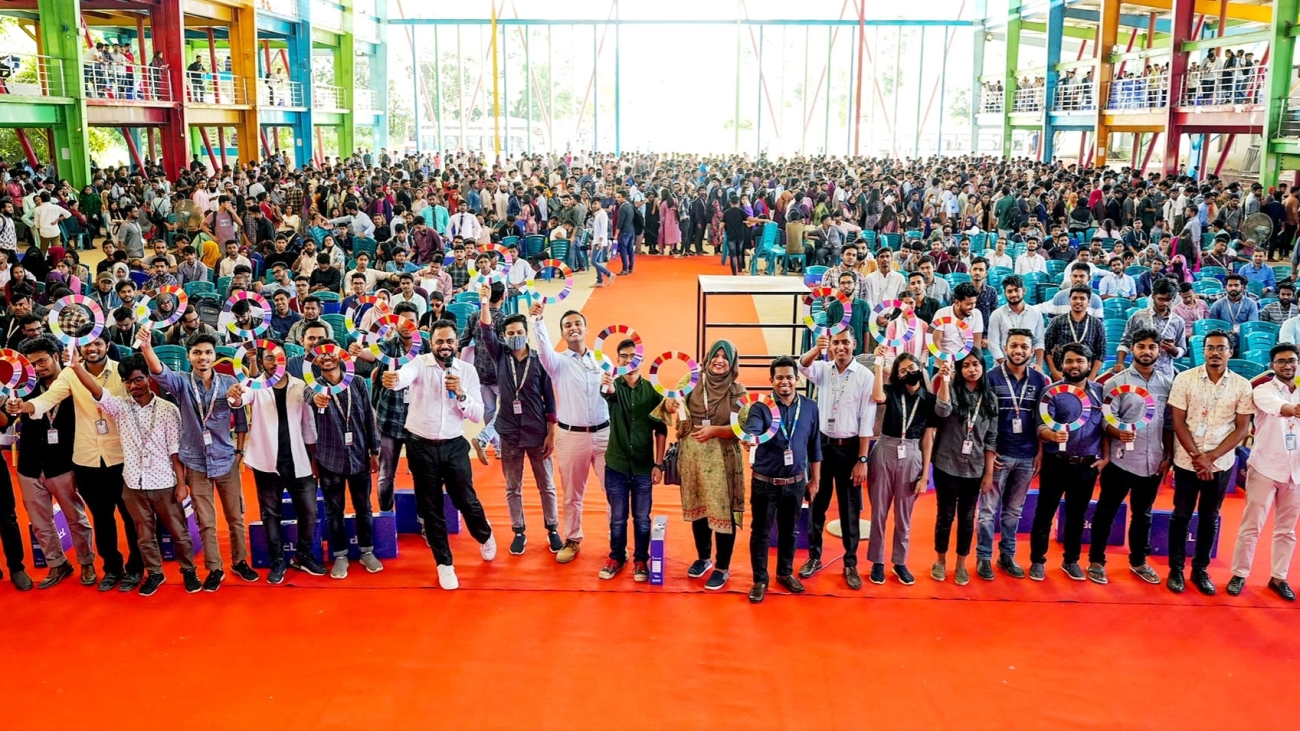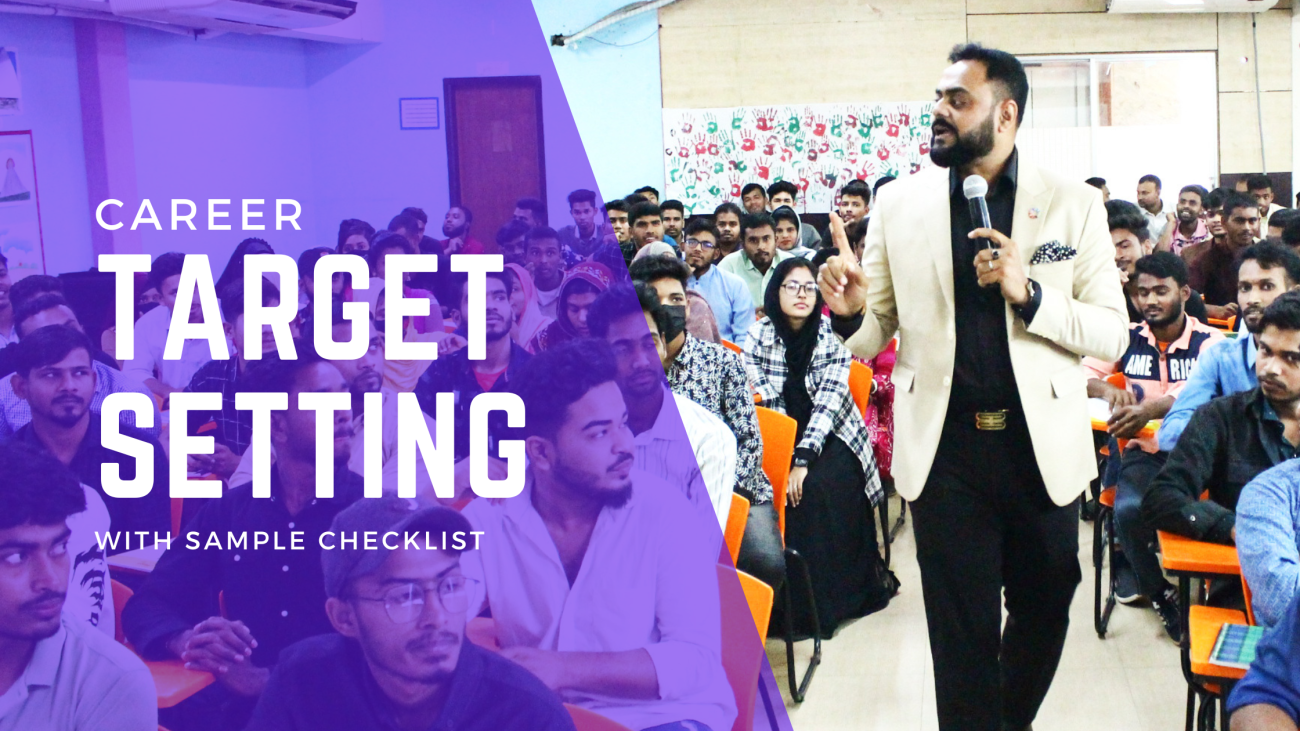আমরা সবাই জাপানের উন্নয়নের গল্প মাঠে, ঘাটে, ক্লাসে আলাপ করতে পছন্দ করি। তাহলে আজকের লেখাটি ঐদেশের একটি গল্প দিয়ে শুরু করি। দ্বিতীয় বিশ্বযুদ্ধের পর, জাপান পুরোপুরি ধ্বংসস্তূপে পরিণত হয়েছিল। তবে জাতির প্রতি দৃঢ় অঙ্গীকার ও নিজস্ব স্বার্থকে সর্বাগ্রে রাখার মানসিকতা থেকেই তারা দ্রুত পুনর্গঠনের পথে হাঁটে। দেশীয় প্রযুক্তি, শিল্প, এবং সংস্কৃতিকে বিকশিত করে জাপান নিজেদের বিশ্বমঞ্চে শক্তিশালী করে তোলে। জাপানের এই গল্প আমাদের শেখায় যে, যখন একটি জাতি নিজস্ব স্বার্থকে সর্বাধিক গুরুত্ব দেয় এবং একতাবদ্ধ হয়ে এগিয়ে যায়, তখন তারা যেকোনো বিপর্যয় থেকে পুনর্জন্ম নিতে সক্ষম হয়। বাংলাদেশের জন্যও জাপানের এই প্রো-জাপানীজ নীতিই পথ নির্দেশক হতে পারে, যা আমাদের ভবিষ্যৎকে আরও শক্তিশালী ও সমৃদ্ধ করতে সহায়ক হবে।
আমরা সবাই বিশ্বাস করি যে একটি জাতির অগ্রগতির মূল শক্তি হলো তার নিজস্ব স্বার্থের প্রতি অঙ্গীকারবদ্ধতা। আমি পৃথিবীর যত উন্নত দেশে গিয়েছি সেখানে দেখেছি কিভাবে তারা সবাই “দেশের স্বার্থ সবার আগে” রেখে উন্নয়নের যাত্রা নির্ধারণ করে। “দেশের স্বার্থ সবার আগে” এই মূলমন্ত্রের ওপর ভিত্তি করে আমরাও একটি প্রো-বাংলাদেশ (Pro-Bangladesh) নীতি গ্রহণ করতে পারি, যা আমাদেরকে একটি আত্মনির্ভরশীল জাতিতে রূপান্তর করতে সাহায্য করবে বলে আমি বিশ্বাস করি। রাংলাদেশের স্বার্থকে সর্বাধিক গুরুত্ব দেওয়ার মাধ্যমেই আমরা অর্থনৈতিক, সামাজিক, এবং রাজনৈতিকভাবে শক্তিশালী হয়ে উঠতে পারি।
আমি অনেক বছর ধরেই ”প্রো-বাংলাদেশ” নিয়ে ব্যক্তিগত গবেষণা করছি। বিশদভাবে বর্ননার আগে চলুন একটু বোঝার চেষ্টা করি প্রো-বাংলাদেশের মূল উদ্দেশ্য কি? ”প্রো-বাংলাদেশ” হলো জাতীয় স্বার্থকে সর্বাগ্রে রাখা এবং বিদেশী শক্তির প্রভাব থেকে মুক্ত থাকা। আমরা জানি যে, বিশ্বের অন্যান্য দেশগুলো নিজেদের স্বার্থকে সর্বোচ্চ গুরুত্ব দেয় এবং সেই অনুযায়ী কাজ করে যেমন আমেরিকা, চীন, জাপান, ভিয়েতনাম এমনকি ভারত। আমাদেরকেও ঠিক একইভাবে নিজেদের স্বার্থের প্রতি প্রতিশ্রুতিবদ্ধ হতে হবে।
প্রো-বাংলাদেশ নীতি বা “দেশের স্বার্থ সবার আগে” নিয়ে আলোচনা করলে উদাহরণ হিসেবে ভিয়েতনামের নাম চলে আসবেই। ভিয়েতনাম তার আন্তর্জাতিক সম্পর্ক এবং অভ্যন্তরীণ নীতিতে জাতীয় স্বার্থকে সর্বোচ্চ প্রাধান্য দেয়। উদাহরণস্বরূপ, ভিয়েতনাম স্বাধীন ও বহুমুখী পররাষ্ট্রনীতি অনুসরণ করে, যেখানে অন্যান্য দেশের প্রভাব থেকে নিজেকে মুক্ত রাখার চেষ্টা করে এবং সবসময় জাতীয় স্বার্থকে অগ্রাধিকার দেয়। অর্থনৈতিক উন্নয়নে তারা স্থানীয় শিল্প এবং স্বনির্ভরতাকে গুরুত্ব দেয়, যদিও বিদেশি বিনিয়োগকেও স্বাগত জানায়। এছাড়াও, জাতীয় ঐক্য ও সংস্কৃতি রক্ষায় তারা জাতীয়তাবাদী নীতি প্রয়োগ করে। সার্বিকভাবে, প্রো-ভিয়েতনাম নীতির মাধ্যমে জাতীয় স্বার্থ, সার্বভৌমত্ব এবং সংস্কৃতির সুরক্ষায় কৌশলগত পদক্ষেপ গ্রহণ করে।
আমি মনে করি বাংলাদেশের ” প্রো-বাংলাদেশ” নীতিকে ঢেলে সাজাবার এখন সময় এসেছে যেখানে আমরা ৬টি বিষয়কে প্রাথমিকভাবে গুরুত্ব দিতে পারি। যেমনঃ
১. অর্থনৈতিক দিক থেকে আত্মনির্ভরশীল হওয়া প্রো-বাংলাদেশ নীতির একটি গুরুত্বপূর্ণ দিক হবে। আমাদের দেশে প্রাকৃতিক সম্পদ আছে, একটি লোভনীয় ভৌগলিক অবস্থান আছে, কর্মক্ষম মানবসম্পদ আছে। আমরা আমাদের উৎপাদনশীলতার ওপর যদি একটু জোর দেই এবং “দেশের স্বার্থ সবার আগে” এই স্লোগানটিকে যদি মূলমন্ত্র হিসেবে গ্রহণ করি তাহলে আমার বিশ্বাস একটি শক্তিশালী অর্থনৈতিক ভিত্তি আমরা গড়ে তুলতে পারবো। কয়েকটি জায়গায় আমাদের বিশেষ গুরুত্ব দিতে হবে যেমনঃ
- তরুণের মেধাকে কাজে লাগিয়ে দেশীয় শিল্প ও কৃষিক্ষেত্রে উদ্ভাবন ও প্রযুক্তির ব্যবহার বাড়াতে হবে আমাদের। এতে করে আমরা আমদানি নির্ভরতা কমিয়ে নিজেদের উৎপাদন সক্ষমতা বাড়াতে পারব। কোন একটি সভায় একজন গবেষক বলেছিলেন বিদেশ থেকে তৈরি পন্য শুধু আমদানী করা হয় না বরং সাথে বেকারত্ত্বকেও আমদানী করা হয়।
- দুর্ভাগ্যবশত আমরা ছোটবেলা থেকেই শুনে আসছি দেশী পন্য কিনে হন ধন্য্। এটি সম্ভবত বিজ্ঞাপনের প্রচার বার্তার মধ্যেই সীমাবদ্ধ রয়েছে। আমাদের দেশীয় পণ্য ও সেবাকে প্রাধান্য দিয়ে “মেইড ইন বাংলাদেশ” ব্র্যান্ড গড়ে তুলতে হবে, যাতে দেশের মানুষ দেশীয় পণ্য কেনার প্রতি উৎসাহিত হয়।
- আমাদের উৎপাদিত পণ্যের আন্তর্জাতিক বাজারে প্রবেশ নিশ্চিত করতে হবে, যাতে বৈদেশিক মুদ্রা অর্জন এবং দেশের অর্থনৈতিক সমৃদ্ধি অর্জন সম্ভব হয়।
২. আমাদের সমৃদ্ধ সংস্কৃতি, ঐতিহ্য, এবং সামাজিক মূল্যবোধকে সম্মান জানিয়ে আত্মনির্ভরশীল জাতি হিসেবে মাথা উঁচু করে দাঁড়াতে হবে। দলমত নির্বিশেষে জাতীয় ঐক্য ও ভ্রাতৃত্বের মনোভাব প্রতিটি নাগরিকের মধ্যে জাগ্রত করতে হবে, যা বৈশ্বিক চ্যালেঞ্জ মোকাবিলায় আমাদের শক্তি যোগাবে। স্বাধীনতা অর্জনের ৫২ বছর পর, এখন সময় এসেছে স্বাধীনতায় প্রত্যেকের অবদানের সঠিক উপস্থাপন এবং শিক্ষাব্যবস্থায় দেশপ্রেম ও নৈতিকতা অন্তর্ভুক্ত করার। আমাদের সংস্কৃতি ও ঐতিহ্যকে বিশ্বব্যাপী ছড়িয়ে দিতে হবে, যাতে আমরা বিশ্বে আমাদের স্বকীয়তা বজায় রাখতে পারি।
৩. আমাদের দেশের রাজনীতিতে প্রো-বাংলাদেশের চর্চা করা অত্যন্ত জরুরি। বর্তমানে দেশে মেধাভিত্তিক রাজনৈতিক চর্চার অভাব রয়েছে, এবং তরুণরা রাজনীতিকে শুধুমাত্র দলভিত্তিক কার্যক্রম, সভা, সেমিনার, মিছিল, হরতাল হিসেবে দেখে। এ কারণে তারা রাজনীতিকে ঝামেলা মনে করে এবং বলে, “আমি রাজনীতি পছন্দ করি না।” কিন্তু সত্যিকার অর্থে রাজনীতি মানে দেশের উন্নয়নের প্রতি সচেতন থাকা, যা বিজ্ঞ রাজনীতিবিদরা উপলব্ধি করে থাকেন কিন্তু সেভাবে তরুনদের রাজনীতিতে অবদান রাখার ব্যপারে অনুপ্রেরণা দেন না। আমাদের রাজনৈতিক অঙ্গীকার হতে হবে বিদেশি কোনো দেশ বা গোষ্ঠীর প্রতি পক্ষপাতিত্ব না করা, বরং নিরপেক্ষ অবস্থান বজায় রাখা। আমাদের সব সিদ্ধান্ত দেশের স্বার্থে হতে হবে, কোনো বৈশ্বিক প্রভাবের কারণে নয়। দেশের স্বার্থকে প্রাধান্য দিয়ে সুশাসন ও জবাবদিহিতার পরিবেশ নিশ্চিত করতে হবে, যাতে জনগণের আস্থা বাড়ে এবং দেশপ্রেমের ভিত্তি মজবুত হয়।
৪. জাতীয় নিরাপত্তা ও সার্বভৌমত্ব আমাদের জন্য অত্যন্ত গুরুত্বপূর্ণ। নীতিনির্ধারকদের উচিত কৌশলগত অংশীদারিত্ব এবং আন্তর্জাতিক সম্পর্ক গড়ে তোলার ক্ষেত্রে দেশের নিরাপত্তা এবং সার্বভৌমত্বের স্বার্থকে অগ্রাধিকার দেওয়া। প্রতিরক্ষা খাতে স্থানীয় সক্ষমতা বৃদ্ধি, আঞ্চলিক নিরাপত্তা সহযোগিতা এবং আন্তর্জাতিক স্তরে আমাদের স্বার্থ রক্ষার কৌশল গ্রহণ করা।
৫. আমাদের দেশে স্কুল, কলেজ, বিশ্ববিদ্যালয়, মাদ্রাসা সবই আছে কিন্তু দক্ষতা উন্নয়নে বাংলাদেশের মানুষের আবেগ, কর্মক্ষমতা এবং ইচ্ছাশক্তি নির্ভর কোনো কর্মদক্ষতার মডেল নেই। তাই প্রতিবছর ২০ লক্ষ ছেলেমেয়ে চাকরিবাজারে প্রবেশ করছে কিন্তু চাকরি পাচ্ছে না। অনেকে মজার ছলে বলেন ”বাংলাদেশের শিক্ষাব্যবস্থা বেকার তৈরি কারখানায় পরিনত হচ্ছে।” বাংলাদেশীরা মেধাবী শুধুমাত্র চাকরি বা উদ্যোক্তা উন্নয়নের ইকোসিস্টেমের সার্পোটের অভাবে তারা কাঙ্খিত সাফল্য পাচ্ছেন না। উদাহরণস্বরুপ সিঙ্গাপুরের কথা বলা যায়। সিঙ্গাপুর চাকরি ও উদ্যোক্তা উন্নয়নের ইকোসিস্টেমের সাপোর্ট অত্যন্ত শক্তিশালী। সিঙ্গাপুরের সরকার উদ্যোক্তা এবং নতুন ব্যবসার উন্নয়নে ব্যাপকভাবে বিনিয়োগ করেছে, যা দেশটিকে এশিয়ার অন্যতম প্রধান স্টার্টআপ হাব হিসেবে গড়ে তুলেছে। সরকার “স্টার্টআপ এসজি” এবং “এসইএস ফিউচার” এর মতো প্রোগ্রাম চালু করেছে, যা নতুন উদ্যোক্তাদের জন্য আর্থিক সহায়তা, পরামর্শ এবং নেটওয়ার্কিং সুযোগ প্রদান করে। এছাড়াও, সিঙ্গাপুরের উন্নত অবকাঠামো, প্রযুক্তিগত দক্ষতা এবং শক্তিশালী আইনি ব্যবস্থা উদ্যোক্তাদের সফলতার জন্য একটি আদর্শ পরিবেশ তৈরি করেছে। দেশটির বিশ্বমানের শিক্ষা ব্যবস্থা এবং গবেষণা কেন্দ্রগুলো নতুন উদ্যোক্তাদের উদ্ভাবনী চিন্তাধারাকে উৎসাহিত করে। এই শক্তিশালী ইকোসিস্টেমের ফলে সিঙ্গাপুর শুধু এশিয়ার নয়, বরং বিশ্বব্যাপী উদ্যোক্তা ও ব্যবসায়িক উন্নয়নের জন্য একটি মডেল হিসেবে পরিচিত। বাংলাদেশের তরুণ প্রজন্ম আমাদের ভবিষ্যতের মূল চালিকা শক্তি। তাদের শিক্ষা ও দক্ষতা উন্নয়নে বিনিয়োগ করা দেশের স্বার্থে অত্যন্ত গুরুত্বপূর্ণ। নীতিনির্ধারকদের উচিত শিক্ষা খাতে পর্যাপ্ত বাজেট বরাদ্দ, কারিগরি শিক্ষা ও প্রশিক্ষণকে আধুনিকীকরণ, এবং গবেষণা ও উদ্ভাবনে বিনিয়োগ বৃদ্ধি করা। এই পদক্ষেপগুলো বাংলাদেশের অর্থনীতিকে আরও শক্তিশালী এবং বৈশ্বিক বাজারে প্রতিযোগিতামূলক করে তুলতে সহায়ক হবে।
৬. দেশের সার্বিক উন্নয়নের জন্য সামাজিক ন্যায়বিচার এবং অন্তর্ভুক্তিমূলক উন্নয়ন নিশ্চিত করা আবশ্যক। নীতিনির্ধারকদের উচিত এমন নীতি তৈরি করা যা দেশের সব শ্রেণীর মানুষকে উন্নয়নের অংশীদার করে তোলে। গ্রামীণ উন্নয়ন, নারীর ক্ষমতায়ন, এবং পিছিয়ে পড়া জনগোষ্ঠীর উন্নয়নে বিশেষ গুরুত্ব দিতে হবে।
৭. বাংলাদেশের অর্থনীতির অক্সিজেন বলা হয় প্রবাসী ভাইবোনদের। প্রবাসী বাংলাদেশীরা দেশের অর্থনীতিতে এবং আন্তর্জাতিক পর্যায়ে বাংলাদেশের ভাবমূর্তি উন্নয়নে গুরুত্বপূর্ণ ভূমিকা পালন করে থাকেন। তাদের কর্মসংস্থান, দক্ষতা এবং বৈদেশিক মুদ্রার অবদান আমাদের অর্থনৈতিক ও সামাজিক অগ্রগতির জন্য অপরিহার্য। “দেশের স্বার্থ সবার আগে” প্রো-বাংলাদেশ নীতির আওতায় প্রবাসী বাংলাদেশীদের সুবিধা বৃদ্ধি এবং দেশের উন্নয়নে তাদের কার্যকরভাবে কাজে লাগানোর জন্য কিছু পদক্ষেপ গ্রহণ করা যায় যেমনঃ প্রবাসী কল্যাণ ফান্ডের সম্প্রসারণ ও সেবা বৃদ্ধি, প্রবাসী উদ্যোক্তা নেটওয়ার্ক গঠন, প্রবাসী দক্ষতা ও জ্ঞানকে কাজে লাগানো, বৈদেশিক মুদ্রা প্রেরণ সহজীকরণ, প্রবাসীদের দেশের উন্নয়ন প্রকল্পে যুক্ত করা, ইত্যাদি। এছাড়া প্রবাসীদের জন্য আরপিএল (Recognition of Prior Learning) এবং আরসিসি (Recognition of Current Competency)’র মতো আন্তর্জাতিক মডেলগুলোর দিয়ে প্রবাসীদের দক্ষতা উন্নয়ন এবং স্বীকৃতি প্রদানের ব্যবস্থা করা যাতে তারা স্বল্প আয় থেকে উচ্চ আয়ে স্থানান্তরিত হতে পারে।
উপসংহার
পরিশেষে বলবো, প্রো-বাংলাদেশ নীতি আমাদেরকে শুধু অর্থনৈতিকভাবে শক্তিশালী করবে না, বরং সামাজিক ও সাংস্কৃতিকভাবে গর্বিত এবং ঐক্যবদ্ধ জাতিতে পরিণত করবে। বিদেশি প্রভাব থেকে মুক্ত থেকে আমরা নিজেদের সিদ্ধান্ত নিজেই নিতে শিখব, যা একটি স্বাধীন ও আত্মনির্ভরশীল জাতি গড়ে তুলতে সহায়ক হবে। একটি আত্মনির্ভরশীল জাতি হিসেবে বিশ্বে আমাদের স্থান সুসংহত করতে হলে “দেশের স্বার্থ সবার আগে”—এই নীতিতে বিশ্বাসী হয়ে আমাদের নীতিনির্ধারকদের উচিত দেশের সার্বিক উন্নয়নের জন্য সঠিক এবং দূরদর্শী পদক্ষেপ গ্রহণ করা। এই নীতি আমাদেরকে একটি শক্তিশালী, স্বনির্ভর, এবং সমৃদ্ধশালী বাংলাদেশ গড়ে তুলতে সহায়তা করবে। বাংলাদেশের প্রতিটি সিদ্ধান্ত, প্রতিটি নীতি, এবং প্রতিটি পদক্ষেপে জাতীয় স্বার্থকে সর্বাগ্রে রাখা হলে আমরা আমাদের জাতির ভবিষ্যতকে আরও উজ্জ্বল করতে পারব। নীতিনির্ধারকদের এই দৃষ্টিভঙ্গি গ্রহণ করা সময়ের দাবি, এবং এর সফল বাস্তবায়নই আমাদের জাতির উন্নয়নের মূল চাবিকাঠি।
লেখক:
কে এম হাসান রিপন
নির্বাহী পরিচালক, বাংলাদেশ স্কিল ডেভেলপমেন্ট ইন্সটিটিউট
ইমেইলঃ [email protected]










